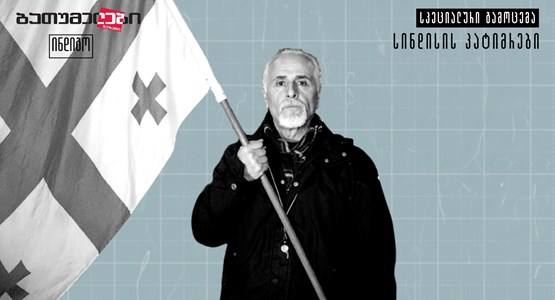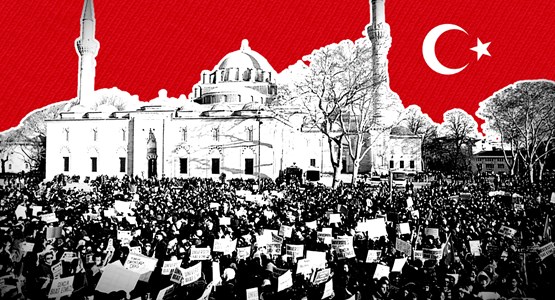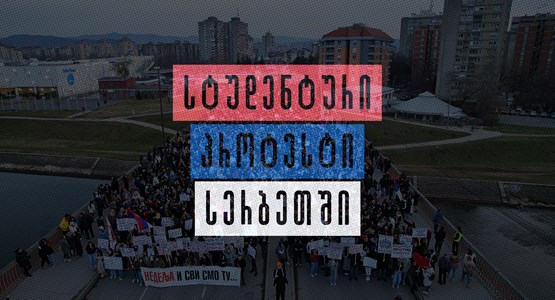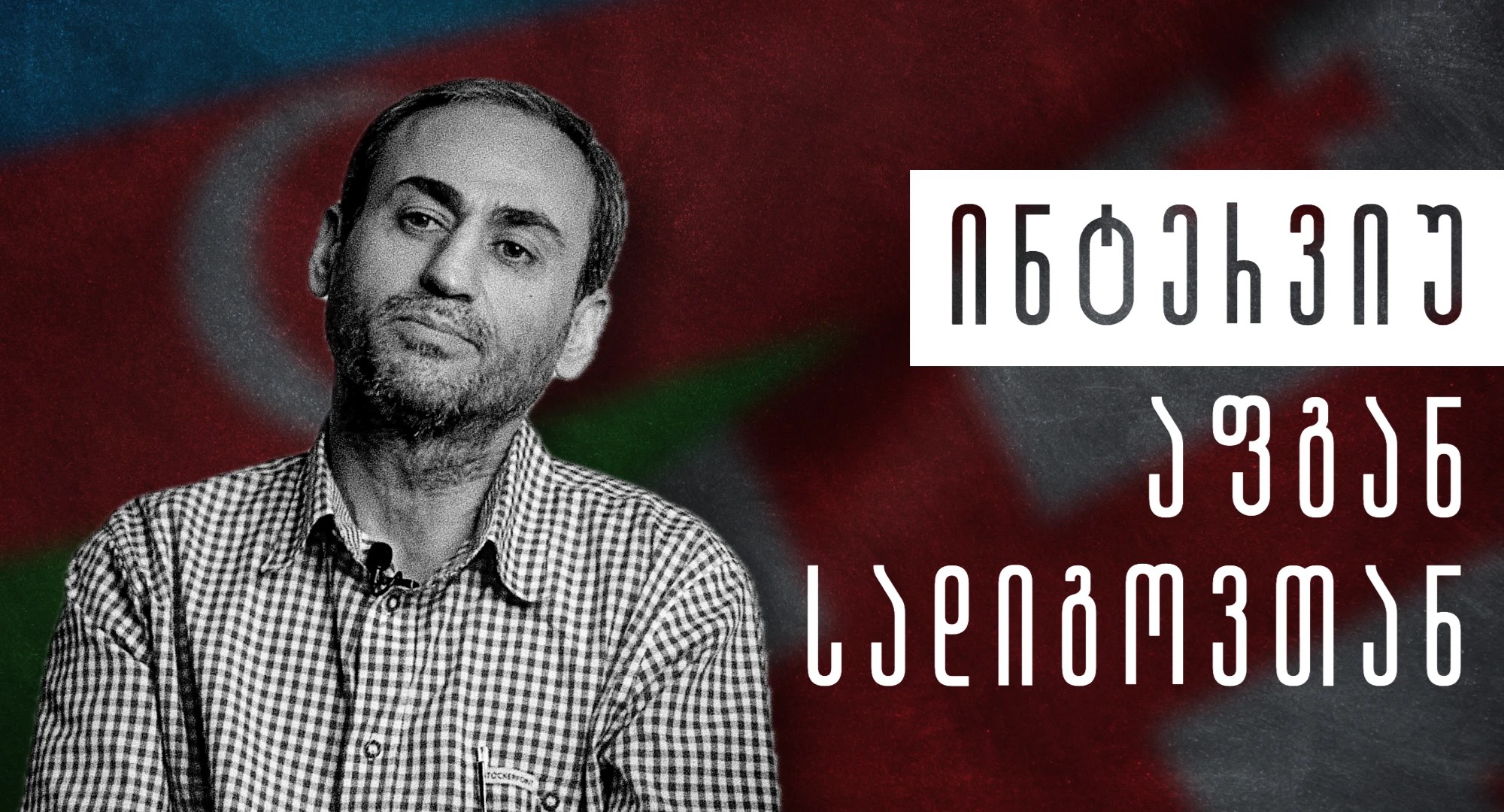
Today, I Live for Tomorrow. But Today is a Battle | Interview with Afqan Sadiqov
The investigative journalist Afqan Sadiqov, who had moved to Tbilisi with his wife and two adolescent daughters, was arrested on August 3, 2024, just eight months after their arrival. The following day, the Tbilisi City Court decided to keep him in pre-extradition detention for three months. Ten days before his arrest, Sadiqov told Radio Free Europe that he no longer felt safe in Georgia and that he had approached the French embassy in Tbilisi, seeking permission to leave the country with his family. Before his arrest, he was denied permission to depart from Tbilisi Airport, his family's passports were stamped, and Afqan was told that the only destination available to him was Baku.
The detained journalist started a hunger strike in Tbilisi prison on September 21, 2024, as a form of protest, and ended it after 161 days. The Social Justice Center, which continuously and thoroughly covered his imprisonment alongside independent Georgian media, actively defended his rights. They were the ones to announce to the public that Sadiqov was released on April 16, 2025, after his extradition detention was replaced by a bail bond.
The European Court of Human Rights ruled on February 27, 2025, that the Georgian authorities cannot extradite the exiled journalist to Azerbaijan. Sadiqov cannot be handed over to Baku until the Strasbourg court makes a substantive decision on his case.
This interview with the freed journalist was recorded on May 6, 2025.
...
Tamar Babuadze: How would you describe the situation you find yourself in now? You’re away from the primary battleground – Azerbaijan, and you cannot be there for your own safety, yet you are freed from prison. How are you feeling in this liminal condition?
Afqan Sadiqov: In the hearts of fighters, the spirit of resistance is always dominant, and their mindset is determined by the will to fight. I’m doing well. The situation I found myself can be described in a straightforward way: I was forced to go through a severe political repression, through a great pressure… I could even call it terror because in dictatorial regimes, repression always turns into terror, that’s a logic of it. In dictatorships people get killed in their homes, the gunshot is fired randomly in densely populated areas, without hesitation, regardless of the neighborhood or children that are around, people get kidnapped or captured.
Repression like this is already happening in Azerbaijan. Georgia started late on this path, but with the help and with the rich experience of leaders like Aliyev and Putin, the process is moving forward very rapidly, unfortunately.
T.B.: In an interview published on May 2 2025 on MediaChecker's website, you mention that the shift towards dictatorship in Azerbaijan began with the oppression of the people, while in Georgia, the starting point is different. However, identifying the initial point from which a dictatorship starts is often difficult: the public oppression and violence are perhaps already the signs of a process gone far. When you observe mass brutality in political and social life, caused by the system, doesn’t that indicate that you’ve missed the warning signs?
A.S.: Every dictatorship begins when the people are first materially impoverished; when they are denied access to income sources. Then, the system increases taxes. That’s what happened to us, and the people felt it right away – their incomes dropped, expenses and unemployment grew. Citizens who had come from abroad easily found jobs, but the locals could not. For example, if it was officially stated that workers in construction earned $50 a day, that amount would remain on paper, but in reality, they were given only $5. People were pushed into poverty to such an extent that they could no longer think about politics; they were consumed by the daily struggle for survival. People were excluded from big business, and all economic sectors were monopolized by the ruling family and those close to the government.
Heydar Aliyev laid the foundation for all of this. He attacked members of the national government, sentencing some to long, others to life imprisonment – purging and eliminating political opponents.
He then signed international agreements related to oil and gas, from which he and his allies took the profits. Ilham Aliyev’s first supporters were those who had spent 20-25 years within his father’s system, seasoned with experience.
In one of my media materials, I said, “Even if dollars and gold fall from the sky, it doesn’t matter – as long as Aliyev is in power, the people of Azerbaijan will remain in poverty.” Even the uniforms for public schools are distributed on the logic of the clan and mafia: a parent must buy the school uniform only from the company they’re told to buy it from. Employees of the healthcare sector are required to contribute a portion of their salaries to their superiors, which then flows upwards to the president. Medicines allocated for state hospitals are sold in private pharmacies, and the money returns to officials. Meanwhile, people are arrested, kidnapped, and asked to pay ransom, forcing them to admit to crimes they didn’t commit. Or they take on bank debt, which becomes a heavy burden. Don’t imagine these things happen separately – it all happens simultaneously.
Now, Azerbaijani citizens work for a minimum living wage. You may meet someone on the street, someone you remember as successful and respected public figure or a qualified professional from the past, and now you see how broken they’ve become.
The most well-known restaurants and hotels in Azerbaijan belong to government officials. These sorts of business can only be run by an ordinary citizen if he partners with the government official.
T.B.: The rule of receiving grants for independent media is regulated by a law similar to FARA, correct?
A.S.: It's even more radical than FARA. I used to keep track of Azerbaijani laws and their names, but now it’s not interesting. In the past, if I said, “They can’t do this because it’s unconstitutional,” the next morning I’d find that the constitutional article had been changed. They used to hold referendums to divert people’s attention, but now they change things without a referendum. The referendum used to be a symbol of democracy for the people, but now they don’t need to show off anything anymore.
So, describing Azerbaijan’s current situation is impossible; you have to see it with your own eyes. They’ve created a state agency for the media, and if you register with them, you become theirs; if not, you remain illegal and are labeled as opposition, which automatically means you’re working for foreign intelligence.
The prosecutor’s office and the courts are at the service of one person. Anyone who comments something undesirable on social media gets arrested. Or the system silences them by employing one of their family members. If a citizen raises a critical question, it is enough to conclude that they are connected to some sort of foreign intelligence and their relatives loose their jobs. If they have a loan in the bank, that becomes a pressure tool; or they directly threaten you: “Your relative is in the army, right? Be careful, he might get shot.” Or, “Be careful yourself; you might get hit by a drunk driver.” I was threatened with my wife: “You have a young wife, and the streets are full of sexual maniacs.” Or, “Your children might get hurt at school.” The other day, I wrote about the Azerbaijani Ombudsman asking who he defends - the people or Aliyev and his government. Can you imagine? The ombudsman suing Amnesty International while protecting President Aliyev?
Aliyev claims that Europe envies Azerbaijan’s development and wants to undermine Azerbaijan through opposition; that the European Court of Human Rights is bribed when it demands the release of arrested journalists. Therefore, he announced that they would no longer follow their demands.
T.B.: What happens after that?
A.S.: After that, nothing happens. People look to God for help. Some fear that even God cannot help anymore. I used to say to them: "Remember, we argued you to protest back in the day, but you kept silence."
T.B.: What’s your observation about the power and achievements of political protests in Azerbaijan?
A.S.: There were protests in the past, and a few years ago, there were more, but then people were scared off by fines and arrests. Now, no one protests, and even more than that, almost no media is left to shoot the footage of protest. Five years ago, when the opposition held a rally, 40 people would gather just for the filming. Now, all the independent journalists are detained. There was Meidan TV, but today many of their staff are in prison. Abzas Media existed, but today their director, editor-in-chief, and employees are in prison. The head of Channel 13 is also in prison. Even the freelance journalists getdetained.
Back in the day, when they would go to cover the news, police would confiscate their phones and cameras, and no one would dare to object. Aliyev says, “Don’t interfere in our affairs; Azerbaijan is democratic, and we will continue as we have.” But in Azerbaijan, the situation is now comparable to North Korea. They still hold elections formally there, but not because they respect their people – it’s for Azerbaijan’s international image. Even if the opposition wins by 90%, Ilham will still come out on top in the ballots. I’ve been an observer at polling stations myself. I’ve seen how it’s done.
T.B.: Do you think there is no adequate and alternative solution offered from the outside democratic world that would not rely on the oppression of Azerbaijani society?
A.S.: This passivity is part of international politics. Western world is forced to accept the current situation, partly because of oil and gas, and partly out of caution – what if, under too much pressure, Aliyev sides with Putin with all his resources. That’s why the Azerbaijani people feel that there is no hope.
T.B.: Since when and with what themes did you start investigative journalism?
A.S.: I started in 2013, and a year later, I was arrested because I was investigating the commissioned murders and the incomes of public officials. When I got out, I continued. Daily news reporters are sentenced to 2-3 years in prison as a form of intimidation, but the most brutal treatment is reserved for investigative journalists. They give sentences of seven years or more, accusing them of smuggling or treason. They arrest a person first, and then frame them with charges. We investigated state officials involved in drug trafficking. They are drug lords and, in turn, answer to two bosses: one is the head of President Aliyev’s security, Baylar Aibov, and the other is Azerbaijan’s Sheikh-ul-Islam.
T.B.: Has society’s reaction to this weakened? Isn’t Sheikh-ul-Islam the highest religious authority?
A.S.: Of course, but some people say, "I don’t want to hear anything, just don’t tell me, because I might get arrested for knowing." Some will say, “Look, Afqan posted a good video showing how he uncovered something,” and then someone else will respond, “I’m afraid to watch it – they’ll know I’ve watched it.”
The next investigation was about how prisoners are treated in prisons. They’ve turned the penitentiary system into a market. They don’t give prisoners their food rations; they sell them in the prison canteen. It’s the same everywhere. For example, if someone in a rural area is sick and needs to be transported to Baku, the ambulance driver will say he doesn’t have gas and will demand money to start the car.
They were afraid of me because I was investigating the properties of the president, his assistants, and security forces. For example, there was a regional head in Gubadli, Avaz Hasanguliyev, who was told by the president’s head of security that he would receive a desired position if he gave him 2 million manat. He took the 2 million and then had him killed. We confirmed this with bank records and comments from relatives. The same happened to the son of the popular poet Jabir Novruz, who was killed after money was taken from him in exchange for a position.
When I wrote that a person had abused his powers and was involved in corruption, the publication of my article led to that person being appointed to a higher position. This was meant to show the people that there is no point in exposing truth and complaining about wrongdoing; simply, it doesn’t matter. According to an investigation, in 2012-13, 3 tons of heroin were transported from Georgia to Azerbaijan by Sheikh-ul-Islam and the director of furniture company Embawood. But nothing changed. In return Sheikh-ul-Islam then addressed the nation and declared Ilham Aliyev as Azerbaijan’s god.
The president pretends to know nothing about the country’s affairs. I, on the other hand, always straightforwardly addresspersonally him, Aliyev: “Are you deaf, blind, sitting on Mars or locked in the treasure-chest? How can you not know what’s happening in your country?”
When you speak quietly to people, sometimes they curse him, saying, "May God take Aliyev soon," but openly, they can’t. Even when two or three friends or relatives get together, they’re already afraid to show their true opinions and to curse Aliyev and his clan.
T.B.: When did you first allow yourself to think that hunger strike could be an adequate instrument in your fight? What made you take this step?
A.S.: I had been on a hunger strike for 242 days in an Azerbaijani prison. In my cell, I realized I had no other instrument at hand. Not a phone, not a pen and paper to write. That was the only thing I could do to express my protest, and I did what I could. For me, it’s always important to fight, not to stop and to raise up my voice is more important than the formof the fight itself.
In prison, when on hunger strike, you don’t think whether you will survive or die. The only thing I had decided was that I wouldn’t bow before these tyrants, and if I died, I wanted to keep my conscious until the end. They conducted raids in my cell, and if I had any writing, they would take my paper and pen. But here, in Tbilisi prison, it wasn’t like that. But wait, the dictatorship gets to this culmination point step by step.
In my case, this is what happened: Aliyev demanded my extradition, the "Georgian Dream" was planning to transfer me, and I was already thinking that neither Strasbourg could help me, and I’d be handed over. So, here too, the hunger strike was a form of struggle.
T.B.: When an activist leaves their country, it’s about physical survival, but now Afqan is alive, he’s survived. The question is what remains of an activist who is forced to give up their profession, which is the most important to them?
A.S.: I don’t recognize such a situation because I’ve never renounced anything. Now, I’ve just made my struggle global, and after coming out of prison, I criticize not only Aliyev but also Irakli Kobakhidze’s government. For me, it’s become one cause.
Now, my media platform is banned: yes, Azel.TV is in their hands, but its YouTube channel still functions and I still have my Facebook. Just two days ago, I posted a collage of two photos – “These are our journalist girls, detained; and this is Mzia Amaghlobeli.” The annotation also says – “Aliyev’s prisoners, Kobakhidze’s prisoners.”
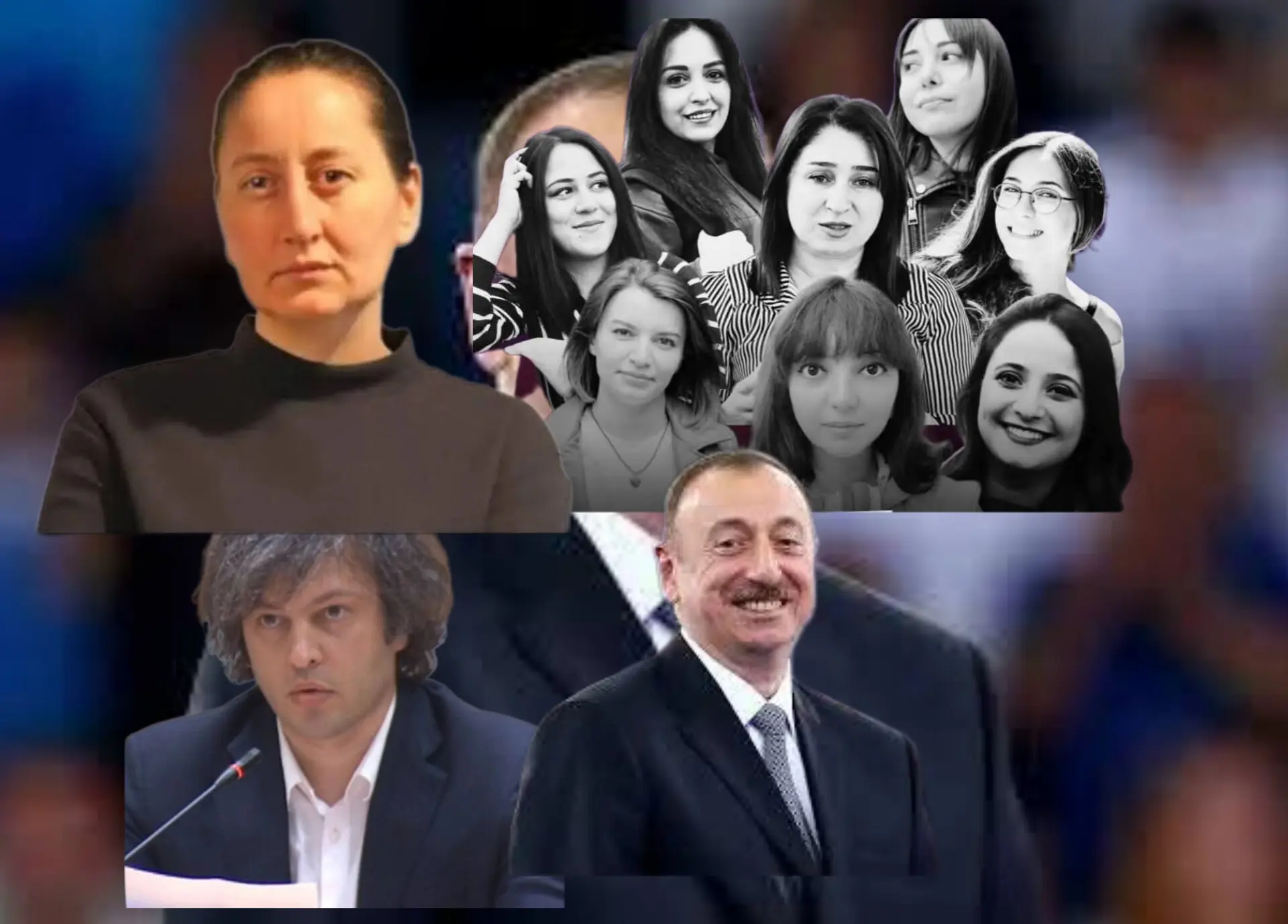
Photo attached to the post published on social networks on May 1
So my fight continues. It will continue until death. That’s how I think: if anywhere a person is oppressed, if anywhere there’s a dictator, I must fight. When they threatened me, I turned to the president and said, “Ilham, I know you’re a killer, here’s where I live, come and kill me.”
T.B.: When was that?
A.S.: Always was like that. Whenever they threatened me that was my answer. After I got out of prison, I made a video – I dug a grave, stood by the pit, and said, “Here’s the grave, I dug it for myself; come and kill me.”
T.B.: Change comes slowly, the battle is long, but I can’t imagine that you don’t think about the future. Do you believe there’s no potential for change at all?
A.S.: Where, here or there?
T.B.: I was asking about Azerbaijan, but – both places.
A.S.: At every conference or any place I speak, I say that the Georgian people are brave and fighters. Use that. Here in Tbilisi, even people within the “Dream” system have told me they don’t like what’s happening. They said, “If we rise, we’re crazy.” They know I won’t speak, my chest hides many secrets. But I responded, “The Azerbaijanis used to say the same thing, today you can say it too, but soon, you won’t even be able to rise, you won’t be able to speak.” Time weakens the people, and the system increases its resources, its agents, and funding. It collects independent media and offers money. Whoever takes it, takes it; whoever doesn’t, ends up in prison. If you don’t take it, you’ll be like me, in prison all your life.
So, if I want to revolt, I’ll revolt when I want to, but it doesn’t work that way. Why not now, why not later?
T.B.: I understand it this way: you live today and today is the battle. You have no fantasies about the future.
A.S.: Yes, today I raise this fight for the sake of tomorrow. Because I won’t have as much influence over tomorrow as the government will. Let’s say we lost today, I’m still going until the end, that’s already decided. I say: even if I’m bedridden, I want to keep the strength to hold a pen. Or I want to have a voice to speak. That’s all I want.
Can you imagine? The Aliyev family has been in power for 32 years, and children are born and grow up without ever having seen anything else. They have no basis for comparison.
Now, it’s impossible for the Azerbaijani people to overturn Aliyev. Unless America intervenes and turns the country into another Syria or Iraq to oust him. Otherwise, what would force the people from within, I can’t imagine. That’s why I say, here, you have a dictator just starting out, like Kobakhidze, and behind him, Ivanishvili with his evil intentions, who, at the same time, is the dark shadow of Putin in Georgia; and if he rises and stands firm, in two or three years, you’ll go through what Azerbaijan went through in 20-30 years.
The independent media and website Azel.tv, founded by Afqan Sadiqov, has been shut down for a long time. However, Afqan and his wife, Sevinc Sadiqova, continue to post videos on YouTube about corruption and other crimes.
Afqan, who had gone out for a grocery shopping, was arrested by Azerbaijani law enforcement officers again in May 2020 (he had been imprisoned before in 2016). They conducted a search of his house, confiscating his personal belongings and records. Later, he was accused of soliciting a bribe from an official for a case he was investigating in his journalistic project. According to Sadiqov’s lawyer at the time, this was retaliation for one of his last investigations, where he uncovered a sexual crime committed by police officers in one of the Azerbaijani city. In November 2020, Sadiqov was sentenced to seven years in prison. The journalist went on a hunger strike. Later, his sentence was reduced to four years, and in May 2022, President Aliyev pardoned him along with other prisoners. His journalistic work continued both during his time in Baku and continues today too after relocating to Georgia.
We Recommend
